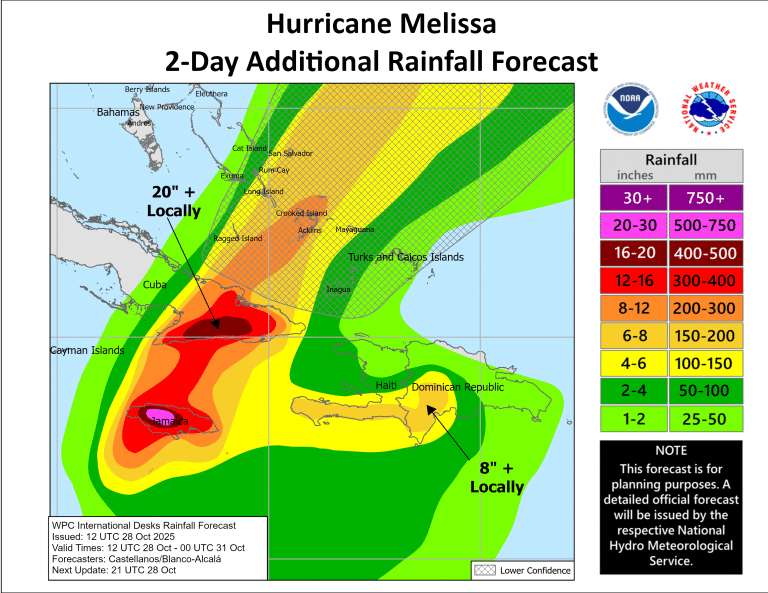Millions of people in Jamaica and across the Caribbean are facing massive impacts from Hurricane Melissa, the strongest tropical cyclone this year anywhere in the world.
At its peak ahead of landfall in Jamaica, Melissa was a category 5 strength on the Saffir Simpson, with life-threatening winds of nearly 300 km/h, devastating storm surge and rainfall. Prime Minister Andrew Holness declared Jamaica as a "disaster area" on 28 October. Much of the island was without communications, with many homes destroyed or under water. There was no immediate reports of casualties.
Melissa hit Cuba as a major Category 3 hurricane and weakened during its passage over the country as it headed towards other Caribbean islands including the Bahamas and Bermuda.
The WMO's Regional Specialized Meteorological Center Miami operated by the US National Hurricane Center issued regular advisories, describing Melissa as extremely dangerous and life-threatening. In rare language, it warned of "total structural failure" near the path of Melissa's centre on landfall in Jamaica.
WMO Secretary-General Celeste Saulo said that the immense threat posed by Melissa highlighted the necessity of WMO's work and the Early Warnings for All initiative.
"Melissa will break many records. But we hope that casualties will be kept to a minimum thanks to the power of prediction, the benefits of international and regional cooperation based on data sharing and observations, and national action and community mobilization based on trust," said Celeste Saulo.
Melissa is the strongest hurricane to hit Jamaica since Hurricane Gilbert in 1988. Many lessons have been learned since then - with more accurate forecasts, longer lead times, and better early warnings.
Jamaican authorities closed the island's main airports and issued emergency orders and red alerts with actions to be taken to keep people safe.
Anne-Claire Fontan, a scientist with WMO's Tropical Cyclone programme, explained that the system will bring three times the normal amount of precipitation for a rainy month in Jamaica, or up to 700 millimeters.
"It means that there will be a catastrophic flash flooding and numerous landslides," she explained. "In addition to the rain and to the destructive wind, you will have storm surge that is expected as well on the southern coast of Jamaica with a three to four meters high in addition to destructive waves," she told a media briefing.
The fact that Melissa is slow-moving will worsen the impact of the rainfall.
Evan Thompson, principal director at Jamaica's national meteorological service and the president of WMO's Regional Association for North America, Central America and the Caribbean, joined government leaders in regular televised press conferences to warn the public of the extreme danger through a series of red alerts.
Melissa is the most dangerous storm in an otherwise relatively low-impact hurricane season. But it takes only one landfalling hurricane to wipe out years of development.
It is the strongest storm so far this year - more powerful than Typhoon Ragusa in September 2025 on the Northwest Pacific.

Humanitarian threat
The United Nations offered its full support to countries across the region. Guided by Resident Coordinators on the ground, the UN is working hand in hand with authorities and humanitarian partners to assess needs, assist those impacted, and prepare in areas that may yet face the storm's impact. UN teams are already prepositioned, with additional staff ready to deploy at short notice, according to a spokesman for the UN Secretary-General.
The UN has allocated $4 million apiece for Haiti and Cuba from its Central Emergency Response Fund to help communities prepare ahead of the storm and reduce its impact as part of the Office for the Coordination of Humanitarian Affairs' anticipatory action programme. In close coordination with affected nations, the UN will also explore launching appeals to respond to the humanitarian needs triggered by Hurricane Melissa.
Aid agencies rushed to support vulnerable communities - including in Haiti which is one of the world's poorest countries.
"Roofs will be tested. Flood water will rise. Isolation will become a harsh reality for many," said Necephor Mghendi, the International Federation of the Red Cross and Red Crescent Society's Head of Delegation for the English and Dutch-speaking Caribbean.
"The humanitarian threat is severe and it's immediate," he said.
Many families are currently still rebuilding from the impacts of Beryl last year and restoring their livelihoods in the Caribbean.
"Melissa now threatens the same communities and maybe all the activities will be wiped out," he warned. "This is an example of how… extreme climate weather events can actually provide shocks to communities and stretch the capacities to withstand them," he explained.
The IFRC official went on to stress that coastal communities remain financially strained, and informal settlements are at risk from intense winds as well as soils that are already saturated by the rainy season, with an "increased likelihood of landslides".
The IFRC's Mr. Mghendi said that in Jamaica the authorities have prepared some 800 shelters and that volunteers are supporting evacuations, helping distribute relief items and reinforcing early warning messages.
A spokesman for the Office for the Coordination of Humanitarian Affairs, Jens Laerke, added that an anticipatory mechanism facilitated by the UN has been activated in Cuba and Haiti which lie on the hurricane's path, triggering a $4 million allocation from the UN Central Emergency Response Fund (CERF) to pre-position food, water, hygiene items and health supplies.
"What are going to be people's basic survival needs? Food, clean water… shelter and of course medical care," he said, explaining that when massive flooding hits, clean water is in short supply, driving a surge in health and epidemic risks.






